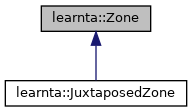|
|
| Zone (const Eigen::Matrix< Bounds, Eigen::Dynamic, Eigen::Dynamic > &value) |
| | Construct a zone from a matrix representing the zone.
|
| |
|
| Zone (Eigen::Matrix< Bounds, Eigen::Dynamic, Eigen::Dynamic > &&value) |
| | Construct a zone from a matrix representing the zone.
|
| |
|
| Zone (Eigen::Matrix< Bounds, Eigen::Dynamic, Eigen::Dynamic > value, Bounds m) |
| | Construct a zone from a matrix representing the zone and the bound.
|
| |
|
| Zone (const std::vector< double > &valuation, Bounds M) |
| | Construct a zone containing only the given valuation.
|
| |
| std::size_t | getNumOfVar () const noexcept |
| |
|
void | tighten (ClockVariables x, ClockVariables y, Bounds c) |
| | add the constraint \(x - y \le (c,s)\)
|
| |
|
void | tighten (const Constraint &constraint) |
| | Add a guard of a timed automaton.
|
| |
|
void | tighten (const std::vector< Constraint > &constraints) |
| | Add a set of guards of a timed automaton.
|
| |
|
void | applyResets (const std::vector< std::pair< ClockVariables, std::variant< double, ClockVariables >>> &resets) |
| |
| void | revertResets (const std::vector< std::pair< ClockVariables, std::variant< double, ClockVariables >>> &resets) |
| | Make it the weakest precondition of the reset. More...
|
| |
|
Zone | operator&& (const Zone &another) const |
| | Returns the intersection of two zones.
|
| |
|
Zone | operator&= (const Zone &another) |
| | Assign the intersection of two zones.
|
| |
|
Zone | operator^ (const Zone &another) const |
| | Returns the juxtaposition of two zones.
|
| |
|
std::vector< double > | sample () |
| | Return a clock valuation in this zone.
|
| |
|
void | close1 (ClockVariables x) |
| | Close using only x.
|
| |
|
void | reset (ClockVariables x) |
| | Assign a constant value to the clock variable x.
|
| |
|
void | unconstrain (ClockVariables x) |
| | Unconstrain the constraint on this clock.
|
| |
| void | elapse () |
| | Assign the strongest post-condition of the delay. More...
|
| |
| void | reverseElapse () |
| | Assign the weakest pre-condition of the delay. More...
|
| |
|
void | canonize () |
| | make the zone canonical
|
| |
|
bool | isSatisfiable () |
| | check if the zone is satisfiable
|
| |
| bool | isSatisfiableNoCanonize () const |
| | check if the zone is satisfiable More...
|
| |
|
| operator bool () |
| | check if the zone is satisfiable
|
| |
|
void | abstractize () |
| | truncate the constraints compared with a constant greater than or equal to M
|
| |
| void | extrapolate () |
| | Extrapolate the zone using the diagonal extrapolation based on maximum constants. More...
|
| |
|
void | makeUnsat () |
| | make the zone unsatisfiable
|
| |
| bool | includes (const Zone &zone) const |
| | Return if this zone includes the given zone. More...
|
| |
| bool | operator== (const Zone &z) const |
| | Check the equivalence of two zones. More...
|
| |
| bool | equalIgnoreZero (Zone z) const |
| | Check the equivalence of two zones. More...
|
| |
| bool | strictEqual (Zone z) const |
| | Check the equivalence of two zones. More...
|
| |
Implementation of a zone with DBM.
- Note
- internally, the variable 0 is used for the constant while externally, the actual clock variable is 0 origin, i.e., the variable 0 for the user is the variable 1 internally. So, we need increment or decrement to fill the gap.
